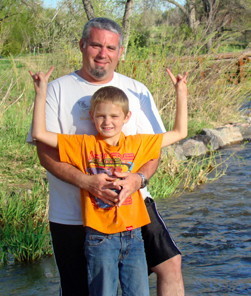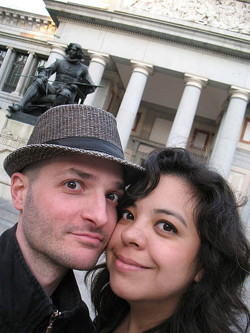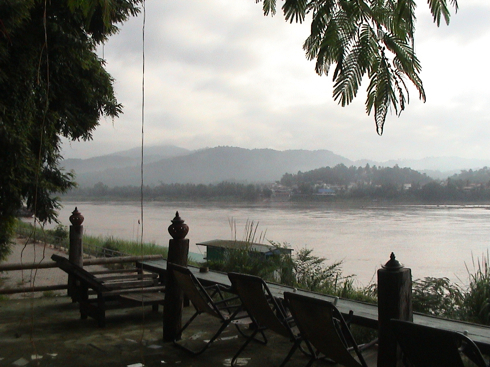Rolf Potts's Blog, page 126
June 2, 2011
Book review: Stand Up Paddling
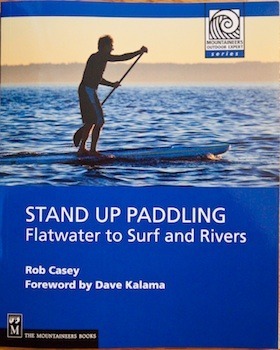 When learning a new sport, especially one that you can do in a variety of environments like stand-up paddling (SUP), it's not always convenient to take a class. But that doesn't mean you can't snag a solid how-to book to tote with you on your adventures—whether it's merely paddling on a calm river or learning to surf.
When learning a new sport, especially one that you can do in a variety of environments like stand-up paddling (SUP), it's not always convenient to take a class. But that doesn't mean you can't snag a solid how-to book to tote with you on your adventures—whether it's merely paddling on a calm river or learning to surf.
In Stand Up Paddling: Flatwater to Surf and Rivers, author Rob Casey outlines everything from gear to paddling strokes to injury prevention. Yearn to surf SUP, hit the flatwater, or learn to paddle rivers? There's a chapter for each discipline to focus on.
Short features on expert paddlers give insights into how they discovered the sport and pointers for novice paddlers. The diagrams and photos help illustrate elements that are often difficult to communicate in words—so you can not only read how to execute a paddle technique, but also see it done.
Whether you're interested in boarding at home or while vagabonding, Stand Up Paddling can help you get set up the right way to enjoy the water.
Stand Up Paddling is now available on Amazon in paperback.
June 1, 2011
Having lived abroad for several years now, one travel in...

Having lived abroad for several years now, one travel investment that I can honestly say has been worth the expense many times over is my Amazon kindle. Sometimes travelers can get caught up in the myriad travel accessories there are out there on the market. Will these items make your trip better? Easier? Most seasoned backpackers swear by packing their bags with the absolute minimum, so as not to hamper their travels with the extra weight or worry for these items.
At first glance, a kindle can seem a bit expensive. The computerized books begin at US$114 with the newest version costing around $189 with all of the features. For some this is simply as unwanted expense. I would never have considered undertaking the expense, until I was living in the North of France and found that purchasing the occasional English novel or book amounted to a great expense. English literature is not incredibly plentiful in the region, and what books were in stock were shockingly expensive. If I wanted to read in English it was going to be costly.
Now, living in Asia where I do not have the option of reading in the local language, here too English books are more expensive. There are still English books available at the local bookstore, though they have a considerable mark up. Additionally, literature other than the popular novels can be virtually impossible.
Investing in a kindle not only allows me to read English novels more cheaply, it opens up the whole literary spectrum that is otherwise closed off to me where I am living – or only accessible at a ridiculous import price.
If you are planning to live abroad for any significant time, purchasing a kindle may be beneficial to you. If you are planning to be actively on the road, even for a long duration, a kindle might be an unnecessary expense. It may add extra weight and anxiety to your travels by adding an extra expensive appliance to worry about. Plus, it is always fun to pick up random paperbacks from local hostels or guest houses, leaving your finished paperback behind for other travelers who are passing through.
Vagabonding Case Study: Talon and Tigger
Age: 42 & 9
Hometown: Lakewood, CO
Quote: "You really need a lot less than you think you do."
How did you find out about Vagabonding, and how did you find it useful? Via Twitter, and I have found some of the information very helpful.
What is your job or source of travel funding for this journey? Writing, photography, and medical transcription.
Do you plan to work on the road? Yes, doing the same.
What was the reaction of your friends/family/colleagues as you planned your trip? Everyone expressed jealousy and envy.
Any tips or lessons learned from the travel-preparation process? You really need a lot less than you think you do.
How long do you hope to spend on the road? Trying to make it pretty much indefinite.
Which destinations do you hope to visit? Mexico, Central & most of South America, Antarctica, much of Europe, many different countries in Africa, the Maldives, India, Thailand, the Philippines, Vietnam, Cambodia, Malaysia, Indonesia, Australia, New Zealand, Tahiti, Vanuatu, Fiji, and more.
Which experiences are you most looking forward to? Living in Asia and Africa
What are you packing for the journey? Very little! If it can't fit in our backpacks, it doesn't go. I'm using a 48 L pack, and my son is carrying a 40 L pack.
Do you have any worries or concerns about the journey? Sure. Mostly I sometimes worried if I could really pull this off. Both of us have some minor medical stuff that requires meds, my son has an anxiety disorder among some other special needs. I also sometimes wonder about my ability to be around my child 24/7 with no breaks for extended periods of time. I'm the kind of person who needs some alone time every now and then. And of course financially I wonder at times. I'm trying to keep my work to as few hours as possible.
How can we best follow your adventures? The blog, twitter, and our Facebook page.
Twitter: 1Dad1Kid
Website: 1dad1kid.com
Are you a Vagabonding reader planning, in the middle of, or returning from a journey? Would you like your travel blog or website to be featured on Vagabonding Case Studies? If so, drop us a line at [email protected] and tell us a little about yourself.
May 30, 2011
The wish to travel is characteristically human
"The wish to travel seems to me characteristically human: the desire to move, to satisfy your curiosity or ease your fears, to change the circumstances of your life, to be a stranger, to make a friend, to experience an exotic landscape, to risk the unknown, the bear witness to the consequences, tragic or comic, of people possessed by the narcissism of minor differences. Chekhov said, "If you're afraid of loneliness, don't marry." I would say, if you're afraid of loneliness, don't travel. The literature of travel shows the effects of solitude, sometimes mournful, more often enriching, now and then unexpectedly spiritual."
–Paul Theroux, The Tao of Travel (2011)
(2011)
Just because you've left home doesn't mean you've left home
"Sun, sea and snow have each become a commodity. This turns travelers by default into consumers of climates and landscapes where they can disport themselves on tame terrain, chattering the while with their mates back home on mobile phones. Horace famously put his finger on the hidden dynamic here: Coelum non animum mutant qui trans mare currunt. Different landscape but the same dreary habits of thought."
–James Hamilton-Paterson, "The End of Travel," Granta #94 (2006)
May 27, 2011
The 'no-vacation nation'
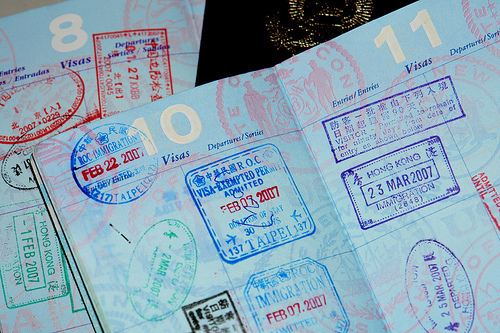
U.S. passports. Photo: J. Aaron Farr / Flickr
The academic schedule is like a shell game. For all of our school years, we get used to having summers off. Then once we start working, those glorious three months get cut down to two weeks.
Every once in a while, the media will tackle this question. The latest entry was this CNN report: Why is America the 'no vacation nation'? Despite what Americans might believe, having only two weeks off is not the norm in other developed countries. For example, the famously hardworking Japanese typically get four weeks off. Europeans are known get anywhere from four to six weeks of paid vacation.
While the article says that the lack of regulation is the problem, I think the issue goes deeper than that. Would more Americans actually go abroad if employers were required to give them more time off?
In my time overseas, the Americans I've met have been far outnumbered by the British, Australian, Canadian, and European vagabonders on the road. Some make the argument that America is geographically isolated, so people are less inclined to travel. Australia seems to demolish that idea, since it's even more isolated than the United States.
Some say it's rooted in the Protestant work ethic of America's founders. Hard work is a virtue, while leisure is branded as a sin. However, do some people use "busyness" as an excuse to avoid facing the bigger questions in their lives? What's better: suffering nobly, or making a life change?
I'll close with this quote, which sums up my feelings nicely:
"All courses of action are risky, so prudence is not in avoiding danger (it's impossible), but calculating risk and acting decisively. Make mistakes of ambition and not mistakes of sloth. Develop the strength to do bold things, not the strength to suffer"
–Niccolo Machiavelli
What do you think? Please share your thoughts in the comments.
May 26, 2011
Unusual packing items
 Vagabonders can be masters of packing methods, as well as knowing which items are absolutely necessary and which can be left behind. Recently, a Lifehacker article (Unusual Items Worth Packing on your Next Vacation) suggests some additional things to consider stashing in your bag before your next big trip.
Vagabonders can be masters of packing methods, as well as knowing which items are absolutely necessary and which can be left behind. Recently, a Lifehacker article (Unusual Items Worth Packing on your Next Vacation) suggests some additional things to consider stashing in your bag before your next big trip.
Some of the items are somewhat old-hat, such as keeping a color copy of your passport in your bag, as well as duct tape. Others, like split key rings to use as locking devices, and baby powder to help get unwanted sand off your feet (see also: shower), may make you think about other uses for common items that are worth adding them to your packing list.
Do you have a tried-and-true unusual item that you always bring along? What is it, and how does it enhance your travel experience?
May 25, 2011
Inspiring places around the globe
Perusing the Lonely Planet website recently, I was drawn to this April article of Top 10 Cities for Artistic Inspiration. Travel can inspire us on a multitude of levels. It can inspire us to move somewhere new, embark on a new career or educational path, to write a novel or memoir, or even to produce other creative works. Great vagabonding voices like Jack Kerouac created some of their most beautiful works from the inspiration found while traveling new areas.
The article covers inspiring cities in North and South America, Europe, the Caribbean, and Asia. Reading through, I found myself nodding along with the author's evaluation of those cities on the list that I had been to, epic cities like San Francisco and London that seem to be epicenters of the art world. However, creative inspiration can be something that is very specifically tailored to an individuals tastes. Some may find endless inspiration in the chaotic crowds of Khao San Road, while others find illumination in the quiet streets of Brugge. Some cities and countries can offer rich traditions in painting or music, but perhaps you are moved more deeply by dance or architecture. Keeping in mind, it's not always the most beautiful places that are the most personally inspiring.
In which countries or cities have you found your greatest inspiration? In which ways did it inspire you?
Vagabonding Case Study: Aron and Mariana
http://aronymariana.blogspot.com
Age: 33
Hometown: Mexico City
Quote: "Life is short. Go! Now! Our only regret is not having done this sooner."
How did you find out about Vagabonding, and how did you find it useful before and during the trip?
We first found out about it on Rolf's site. It's "yes, it can be done" philosophy became part of our inspiration, and a lot of tips from the book helped with the pre-trip organization.
How long were you on the road?
Fourteen months… and counting. We're still on the road.
Where all did you go?
First we traveled three months within Mexico, our home country, from north to south, visiting cities and small villages in 12 states. After that we flew to Belgium to begin our European leg of the trip: Brussels, Gent, Bruges, London, Liverpool, Norwich, Amsterdam, Edam, Cologne, Giessen, Leipzig, Berlin, Barcelona, Bilbao, Madrid and Seville, where we currently are.
What was your job or source of travel funding for this journey?
We saved some money before quitting our long-time jobs (as a translator and a journalist), and we sold a lot of things when we left our apartment. However, this trip was meant to become self-sustainable at some point, and for the last several months we've been doing all sorts of odd jobs to fund our traveling way of life.
Did you work or volunteer on the road?
We've worked researching textbooks in Spanish; painting apartments; posing for photographers and painters; as movie extras; doing translations and proofreading; as real estate agents; and acting in commercials, among other things. Not everything is great money, of course, but most things make up for it by being interesting experiences.
And we just started working in a hostel in sunny Seville, so we'll be living for some time here. We're very excited about that.
In addition to that, I (Aron) am a photographer, and we've been selling some of my photographs when we've had the chance, both in flea markets and online (you can check my work at www.aroncovaliu.com.)
Of all the places you visited, which was your favorite?
Berlin! We didn't know what to expect when we arrived and our plan was only to visit for a week or two, and we ended up living there for over two months. We felt at home there and loved the atmosphere of openness and tolerance; we met some really friendly people and had memorable experiences. The city is vibrant: it's full of art, music, parties and very interesting characters. There's something for everyone. We left happy and wishing we could stay longer or come back soon, which is how you should leave a place.
Was there a place that was your least favorite, or most disappointing, or most challenging?
Barcelona was probably the most challenging. We wanted to stay there for a long time for several reasons, but getting any kind of job there is really hard, even for the locals, and life is very expensive.
Did any of your pre-trip worries or concerns come true? Did you run into any problems or obstacles that you hadn't anticipated?
We were worried about what would happen when we ran out of money, which obviously, eventually happened. However, we learned that you don't really need much to be happy.
Which travel gear proved most useful? Least useful?
Most useful: thread and needle (we've repaired everything with them, from clothes to our backpacks); sunblock; and our netbook, to be in touch with the world and manage our couchsurfing.
Least useful: bike locks, we had read they could come in handy for our backpacks, and carried them for a few months. We ended leaving them near a bunch of bikes in Cologne so somebody else could find them and use them.
What are the rewards of the vagabonding lifestyle?
Freedom. We do what we want, and we love it. And the unexpected. Some of the best things are those you didn't anticipate – things that can only happen when you travel, like finding yourself in the middle of an eerie night funeral procession for the town's tailor in rural Mexico; crashing a traditional juchiteca wedding; spending a romantic evening with cheap wine and pizza in a crappy roadside hotel after hitchhiking unsuccessfully for hours; or being part of the cast of the Rocky Horror Picture Show Berlin for one night. Also, the friends we've made. Most of the last 14 months we've been couchsurfing, and it has been the most rewarding experience. We've become really close to some great people we would have never met otherwise. Our trip is measured by experiences and friends (if you'll excuse the cliché), and we consider ourselves lucky.
What are the challenges and sacrifices of the vagabonding lifestyle?
Financial uncertainty, of course, is always present. We don't have the financial security and the purchasing power we used to have (although thanks to that we've become much wiser with the money we do have). And depending on the kindness of strangers: we've met the most wonderful and generous people, but still you're vulnerable to them and have to adjust to their lives.
Also, it can be tiresome from time to time. Sometimes we miss having our own home, having a wall to hang a picture we like, being able to just go there and stay quietly alone in bed… but we figure someday we might have all that again, plus what we have now. The best of both worlds.
Another sacrifice is always being away from your people. Even when you meet someone new to whom you become close, or when you run into old friends on the road, after a while you leave them too. You're always saying goodbye.
What lessons did you learn on the road?
You become very tolerant, and very adaptable. You start seeing life from a new perspective.
And you realize that what you read is true: almost anyone can do it. It's a matter of attitude. A couple of months ago we met a 60 year old woman who's been traveling for over three years, couchsurfing, wwoofing, volunteering and working whenever she can, and she's not ready to go home yet. Fear is natural but you can't let it rule your life. Life is short and you won't get back all the time you've wasted, so you better start doing –whatever the hell you want- now!
Traveling we learned to hitchhike on the highway; to cook a lot of different things (and to make the most out of cheap ingredients); to say cheers in several languages; to paint apartments (in Leipzig) and to charge for that (in Barcelona).
We've also learned to say yes as often as we can, to anything. When you're open to life, good things happen to you. Try new things. Don't be picky. Get your hands dirty. It's OK. Life is fun!
How did your personal definition of "vagabonding" develop over the course of the trip?
We understood the concept of travel as a way of life. It's as hard as having a "normal" life (probably harder, when you used to have a safe, comfortable life), but much more rewarding. This is your life, you live "here". When you're moving, and when you settle down for a while, as well. Travel is a way of life and a state of mind. We get so annoyed when people think we're on a long vacation.
If there was one thing you could have told yourself before the trip, what would it be?
That money you saved? Be a bit wiser with it.
Any advice or tips for someone hoping to embark on a similar adventure?
Life is short. Go! Now! Our only regret is not having done this sooner. The right time never comes, so you might as well make it happen yourself. You don't even need to be that brave. People always tell us, "You're so brave! You're such adventurers!" We don't see ourselves that way. The guy who crossed the Amazon on foot is brave and adventurous. We just like to move, learn, share a beer with friends… wherever they are.
Read from people who did the same thing you want to do (there's lots of great sites and blogs) to get an idea and start with confidence. Then go and learn for yourself.
And when you find yourself in a situation where you would normally say no, smile and instead say yes, what the hell. See what happens.
Also: TRAVEL AS LIGHT AS YOU CAN. You don't need so much stuff anyway, and you can always wash those 4 t-shirts. Your back will be eternally grateful.
When and where do you think you'll take your next long-term journey?
People keep asking us, "What's your next step, what are your plans?" and we never provide a satisfactory answer. There are lots of places we'd like to go to, but we're still taking it slowly and being open about things. That said, we'd really like to explore South America, and we'd also like to do a road trip in the US. Africa is very tempting, as well!
Website: aronymariana.blogspot.com
Are you a Vagabonding reader planning, in the middle of, or returning from a journey? Would you like your travel blog or website to be featured on Vagabonding Case Studies? If so, drop us a line at [email protected] and tell us a little about yourself.
May 24, 2011
Sitting still beside great rivers
Chiang Khong, Thailand
It was seven years ago this week that a Honda dealership in Mae Sai, the northernmost town in Thailand, begrudgingly rented me a motorbike for the day. "We don't want to do this," the woman at the counter said, since it wasn't profitable for them, but she also said that thanks to some tourism-friendly law they were required to do so. Apologizing to her for the inconvenience but taking full advantage of the law, I spent the better part of the next ten hours on that bike, tilting into back roads and main roads and exploring the famous Golden Triangle.
In the town of Chiang Khong, half way into the day's journey, I parked in front of a sign that said "Welcome to Bamboo Guest House and Restaurant". It was a backpacker sort of place, and the restaurant overlooked the Mekong River, on the opposite side of which was the Lao town of Huay Xai. I entered the restaurant, bought a coke, and sat.
I was in love with this seat beside a mighty river, which is why the next day I would return by bus and spend the night here. The chairs at the Bamboo provided a place to slow down and reflect, to watch water that had traveled from the mountains of China and now, right before my eyes, was rounding a bend on its way to Cambodia and Vietnam, and then the Pacific Ocean. I thought of other rivers I had seen – the Nile in Cairo, the Mississippi in St. Louis, the Danube in Budapest — and felt the power of watery highways, the presence of Pharaohs and Mark Twain and classical music. I also recalled how as a young kid I first became mesmerized by the Mekong — and the region through which it flows — thanks to a Michael Landon movie called "Love is Forever," based on the real-life story of Australian photojournalist John Everingham, who used scuba gear to get his girlfriend out of Laos.
If you find a seat beside a great river, take it. Often they have shaped entire civilizations. They may also shape the traveler who sits still beside them.
Rolf Potts's Blog
- Rolf Potts's profile
- 321 followers


